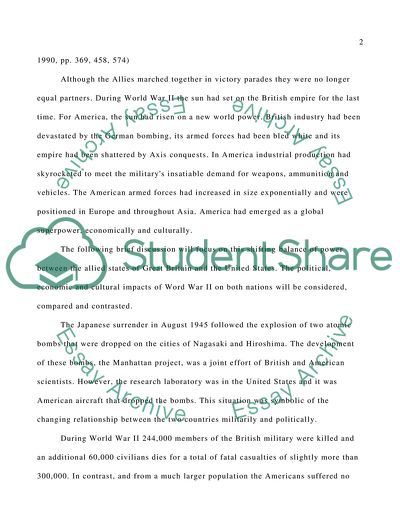Cite this document
(Great Britain and the USA since 1945: Politics and Culture Assignment Example | Topics and Well Written Essays - 1500 words, n.d.)
Great Britain and the USA since 1945: Politics and Culture Assignment Example | Topics and Well Written Essays - 1500 words. https://studentshare.org/history/1740705-analyse-the-relationship-between-britain-and-the-usa-in-terms-of-politics-media-and-culture-since-wwii-evaluate-the-changes-in-these-areas-with-regards-to-their-positive-or-negative-impact-on-britain
Great Britain and the USA since 1945: Politics and Culture Assignment Example | Topics and Well Written Essays - 1500 words. https://studentshare.org/history/1740705-analyse-the-relationship-between-britain-and-the-usa-in-terms-of-politics-media-and-culture-since-wwii-evaluate-the-changes-in-these-areas-with-regards-to-their-positive-or-negative-impact-on-britain
(Great Britain and the USA since 1945: Politics and Culture Assignment Example | Topics and Well Written Essays - 1500 Words)
Great Britain and the USA since 1945: Politics and Culture Assignment Example | Topics and Well Written Essays - 1500 Words. https://studentshare.org/history/1740705-analyse-the-relationship-between-britain-and-the-usa-in-terms-of-politics-media-and-culture-since-wwii-evaluate-the-changes-in-these-areas-with-regards-to-their-positive-or-negative-impact-on-britain.
Great Britain and the USA since 1945: Politics and Culture Assignment Example | Topics and Well Written Essays - 1500 Words. https://studentshare.org/history/1740705-analyse-the-relationship-between-britain-and-the-usa-in-terms-of-politics-media-and-culture-since-wwii-evaluate-the-changes-in-these-areas-with-regards-to-their-positive-or-negative-impact-on-britain.
“Great Britain and the USA since 1945: Politics and Culture Assignment Example | Topics and Well Written Essays - 1500 Words”. https://studentshare.org/history/1740705-analyse-the-relationship-between-britain-and-the-usa-in-terms-of-politics-media-and-culture-since-wwii-evaluate-the-changes-in-these-areas-with-regards-to-their-positive-or-negative-impact-on-britain.


